#The Opposite of Loneliness: Essays and Stories
Photo
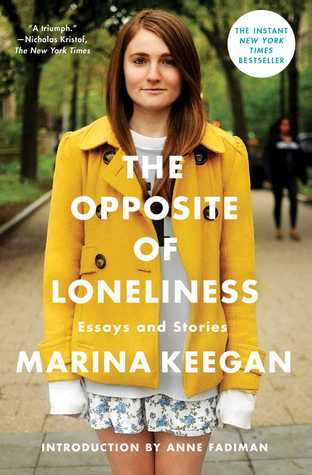
Emma Watson, (Twitter, February 08, 2015)
—The Opposite of Loneliness: Essays and Stories, Marina Keegan (2014)
#Emma Watson#the opposite of loneliness#The Opposite of Loneliness: Essays and Stories#Marina Keegan#books#celebrities
1 note
·
View note
Text
ok people here's my essay. (also note that this was for my english class so it is written in a different style than i usually would. it had to be all formal and grammatically correct and such)
2212 words, analytical essay
She-Ra and the Princesses of Power: A Queer Allegory for Religious Trauma
ND Stevenson’s She-Ra and The Princesses of Power is an animated Netflix original series rebooting the classic 80s show Shera: Princess of Power. This time, however, the show is chalk-full of diversity, varied body types, queer representation, pleasing colour palettes, and a friends-to-enemies-to-lovers lesbian romance. The first four seasons follow Adora (aka She-Ra) and the princesses of Etheria’s fight against the Evil Horde, using their magic to try bringing peace and justice to the planet. A portal is opened at the end of the fourth season, however, bringing the planet of Etheria out of the isolated dimension of Despondos. No longer separated from the rest of the universe, Horde Prime arrives at Etheria- not only bringing higher stakes than any season preceding it, but an entirely new layer of symbolism to the series. The final season was a clear allegory for religious trauma, an especially relevant topic for the show’s majorly queer audience.
When his armada arrives at Etheria, Horde Prime sends his army of clones and robots down to take the planet by force. Unlike the Evil Horde that had been trying to take the planet before Prime’s arrival, who were disorganized, messy, and industrial, everything under Prime is sleek, elegant, efficient, and most importantly: white. Horde Prime’s ships are white, Horde Prime’s robots are white. Horde Prime’s skin is white, his hair is white, his clothes are white, as are all his clones. Pure, unblemished white, with only sparing accents of grey or green.
In colour theory, white has a few meanings. The colour can represent purity, cleanliness, innocence, and even righteousness. This colour theory is heavily incorporated into biblical verses, metaphors, and artwork (and some might even argue that our modern idea of white comes from the Bible). In art, God and angels are almost always depicted wearing white, as is Jesus in his resurrection. Halos of white or light yellow are shown adorning holy figures' heads. Several bible verses use white robes or other white objects as a metaphor of the wearer’s purity. White is still used in several Christian rituals/customs today, such as weddings, baptisms, and more. White is one of (if not the) most important colour in Christian lore. Even in instances where pure white isn’t used, there is a clear correlation between light versus dark and good versus evil.
White has more than one meaning, however- on the opposite side of the coin, white can also represent coldness, blankness, emptiness, and loneliness. The most interesting thing about the show’s use of white is that it encapsulates both facets of its representation. Horde Prime uses white to represent his purity and perfection, but to the people of the colourful, messy world Etheria, this is a cold, eerie colour. As are Horde Prime’s ideals. His perfection and purity is synonymous to coldness. The white represents both- not only simultaneously, but as the same thing.
Horde Prime’s empire being entirely white is no coincidence- neither in-story by Prime, nor in real life by the writers. Horde prime uses white to represent everything he stands for, and the writers use white to represent everything Christianity stands for.
Horde Prime is a being that has lived an amount of lifetimes beyond comprehension- every time his body starts to grow old and fail, he selects a new clone of his to insert his memory and very essence into. So even though he has a new body, he is still him. And the reason for this? To fulfill his self imposed purpose of bringing peace and perfection to the universe. To thousands of planets he has been, one at a time, to reach this. Horde Prime believes there is only one right way to do things, and that humanity cannot be trusted to govern themselves.
Every planet he takes goes the same: he arrives with his ships, and slowly implants chips into the neck of each and every being on a planet. These chips take away the autonomy of the host, and they are left blank. No personality, no choices, no person. All their actions are perfectly automated and controlled by a hive mind, and Horde Prime can take specific control of and see through the eyes of any individual at any given time. With Horde Prime in control, there is no war, no famine, no pain. There is only peace, perfection, and purity. And anyone who does not conform, does not accept his gracious rule, are dealt with accordingly. Entire planets have been left desolate and barren, entire peoples subjected to genocide for not accepting Horde Prime. All dead in the name of peace.
These ideals upheld by Horde Prime are strikingly similar to Christianity. Perfection and purity are two of the main ideals of Christianity, in hand with righteousness. Christians strive to “be like Jesus,” to be their idea of a good person, to be loyal to their religion, and to make it into Heaven. Several rituals to “repent” exist when they feel they have not upheld these standards correctly- including prayer, confessionals, sacrament, and baptism. Even though true perfection, purity, and righteousness are typically seen as unattainable to everyone but the Godhead, it is common belief that constant trying will at least get you as close to it as possible. Conformity is another key aspect of Christianity, though it is not advertised, and to the exact extent it is upheld depends on the sect. In general, though, Christianity pressures every one of its followers (and even those who aren’t) to behave a certain way, to think a certain way, and to only associate with others among themselves.
Horde Prime’s way of upholding these ideals isn’t dissimilar to Christianity’s either. Much like Horde Prime’s Galactic Empire, Christianity has had a long history of forced assimilation. From the Spanish conquistadors to the pilgrims and other colonial settlers of North America, death and pain has come in the wake of the spread of Christianity for hundreds of years, amongst various sects of the religion. Native peoples have been murdered for their loyalty to their “savage” non-Christian ways, land has been stolen, and indigenous religions and other important cultural traditions have been changed past recognition or completely erased, all in the name of “saving,” all in the name of “love,” all in the name of “what’s right,” all in the name of God. Christianity is the only right way, Horde Prime is the only right way.
Its likeness to Christianization isn’t the only resemblance Horde Prime’s ways share with Christianity, however. When Horde Prime arrives at Etheria, three people are brought aboard his ship- Queen Glimmer, one of the Etherian rebels that had been fighting against the Evil Horde (and now the Galactic Empire), Catra, a high-ranking member of the Evil Horde that had been taking over Etheria before the Galactic Empire arrived (but is in love with Adora, who is one of the rebels), and Hordak, the leader of the Evil Horde. Hordak was a clone of Horde Prime’s that had been stranded on Etheria, which was in an isolated dimension. He spent his time in isolation trying to take the planet so that if he was ever reunited with Horde Prime, he would be seen as “worthy”. Horde Prime, however, is displeased by Hordak’s actions- claiming that Hordak was trying to take the planet for selfish reasons rather than for Horde Prime, and for giving himself a name. As such, Hordak must be “purified.”
In this purification process, Hordak’s mind is wiped, and he begs for forgiveness and to complete the process. He is then dressed in white and walks into a circular pool with liquid that reaches his waist. The liquid is electrified for several moments, and his screams can be heard, and then it stops. He is left blank, and Horde Prime and the other clones watching praise him for being the purest among them. Later, Catra is subjected to the same process against her will, and is now a mindless servant of Horde Prime as well. This process is almost identical to the Christian concept of Baptism. While exactly how baptism is carried out varies between sects (full submersion under water versus just a sprinkling, infant versus child, etc), the purpose remains the same- to purify past sins.
A more abstract similarity between Horde Prime’s empire and Christianity is the use of titles. Prime’s clones refer to each other as “brother” (and to Catra as “sister,” once she has been “purified”), and Horde Prime as “big brother.” Not all sects of Christianity use such titles to refer to each other, but some do; notably Catholic nuns or members of the Church of Jesus Christ of Latter-Day Saints (Mormons). But even those sects who do not refer to each other as brother and sister often view Jesus as their “older brother” and God as their “heavenly father.”
Horde Prime himself has many more titles than simply “brother” or Emperor of the Galactic Horde, however. Other titles given to him include Ruler of the Known Universe, Regent of the Seven Skies, He Who Brings the Day and the Night, Revered one of the Shining galaxies, and Promised one of a Thousand Suns. In Christianity, Jesus also is referred to by many names. The Saviour, the Redeemer, the Son of God, the Son of Man, King of Kings, Lord of Lords, the Prince of Peace, the Lamb of God, and several more. In addition to titles, some of the phrases in general used by Christians and the Galactic Empire are common. Both use the word “rejoice” when telling of their faith. Amongst Christians, “glory to God in the highest” and “[God] is the same yesterday, today, and forever” are not uncommon phrases. “Glory be to Horde Prime” is a common phrase expressed by the clones, and even more so, the infamous mantra “Horde Prime sees all, Horde Prime knows all” repeated so many times throughout the season.
The titles used for each other perpetuate a feeling of conformity and a feeling of “otherness” concerning those who do not conform. The titles used for their leaders perpetuate subservience, power imbalances, respect, and devotion. The phrases used in relation to their leaders perpetuate devotion and omnipotence. These are true of both Horde Prime’s Galactic Empire and Christianity.
Horde Prime was a genuinely disturbing villain who represented every painful thing Christianity is made of- toxic perfectionism and purity, conformity, obedience, control, and omnipotence. Loss of expression and individuality. The fear of being constantly watched. These are things that anyone with religious trauma may deal with, but it’s especially true of queer people. Queer people have had a long history of oppression at the hand of Christianity (and colonialism in general). From outright murder to conversion therapy and other abuses, from abandonment to dismissal, Christianity has perpetuated all of it for centuries. And it’s still something that happens today.
She-Ra and the Princesses of Power has a majorly queer audience, due to both the creative process of the show and the representation within the series itself. Not only is the creator of the series (ND Stevenson) queer, but so was practically every character- whether they were a main character, side character, or background character with only a few seconds of screen time. One of the main plots of the show is the complicated lesbian romance between Adora and Catra. As such, the series attracted a good number of queer fans, and religious trauma (or at the very least, religious fear) is a topic that hits uncomfortably close for many.
Other pieces of media that incorporate religious imagery have a tendency to be unclear about how it is framed. Is the imagery shown to be wrong and the victim is right and prevails? Is the imagery shown to be right, and the pained victim in terrified denial? Is the imagery shown to be truly wrong but inevitably triumphant anyways, no matter what the victim tries? It is so muddy in so many pieces of media. The important thing about the fifth season of She-Ra and the Princesses of Power was how it was framed. Perhaps it was because it was a kids show, or perhaps it was the queer creators’ spirit and defiance, but the series was clear in their framing of Horde Prime. The perfect white make the audience uneasy. Horde Prime’s retelling of his victories fill the audience with dread and then hollowness. The “baptisms” of Hordak and Catra are disturbing. Every aspect of Horde Prime and everything he stood for was presented as wrong. Without any doubt.
And even more importantly, the people of Etheria were able to prevail. She-Ra and the other princesses were able to defeat Horde Prime and his empire, and free those forced into subservience by his chips. Catra (and Hordak) were saved. The ships were destroyed. The people of Etheria were allowed to be free and express themselves and be people. This message was something very important to the queer audience. Not only was the fifth season an expression of queer pain, but an expression of queer hope. Neither thing should be ignored. Pain is valid. Hope is needed. To be healthy, both need to be recognized. To have a series that expressed both, and in such a queer way, was extremely important to so many people.
#long post#unityrain.txt#tw christianity#religious trauma#christian religious trauma#ex mormon#shera#she-ra#she ra#spop#shera spop#she ra spop#she ra and the princesses of power#she-ra and the princesses of power#shera and the princesses of power#meta#analysis#analytical essay#horde prime#the galactic empire#hordak#spop meta
96 notes
·
View notes
Text
The Ber Months
The Ber Months by ImYourHoneyBee
Rating: General Audience
Word count: 3k
Dean Winchester's camera shoots in full, vivid colour, capturing the juxtaposition of joyful places and the loneliness that inhabits them. Castiel Novak takes gorgeous black-and-white photos. Stark in their colour palette, the pictures allow the vastness of human emotion to captivate its audience without distraction.
Assigned to work together on the creation of a photo essay capturing autumn in America titled The Ber Months, their oppositional world views have an unhappy Dean reluctantly fascinated with Cas’s serenity.
I love Suptober. The lists get published and the creativity starts to flow and if you didn’t already know it, the Supernatural fandom is overflowing with creativity and incredible creators, and Suptober is one of the best times of the year to showcase that talent.
This year has brought us so many stories and new art already, and we’re only a little over halfway through. One of those stories is The Ber Months. Now, I’m a sucker for photographer!Dean, so this was an easy one for me to choose, but having photographer!Cas too is just the gift that keeps on giving. The Ber Months is about two men who share the same passion for photography, but who look at it in completely opposite ways. Dean has a more jaded lens, wanting to share the raw reality of the world they live in, even at it’s darkest moments. Cas wants to share the beauty and joy in the world, the love people have not only for each other but for life itself. Together they are tasked with creating a fall themed coffee table book, and during the journey, they find something in each other.
It’s a sweet story with incredible imagery, and Dean’s pov as he figures out a new way to see things while sharing a lot of fall themed moments with Cas. If you’re looking for a warm story that will make you want to visit a pumpkin patch and drink something warm, then The Ber Months is the fic for you.
#destiel#fic rec#au#<10k#general audience#suptober#modern setting#photograph!castiel#photographer!dean#fluff#road trip#strangers to lovers#author: ImYourHoneyBee#The Ber Months
49 notes
·
View notes
Note
saw your yuki/kyo dissection and i was curious to know what's the other ship you think was an obvious possible option?
... after consulting @cafedanslanuit , Imma say it. For the plot. And Imma write my essay explaining my case. But y'all... don't get mad at me for being right. Strap in, this is gonna be a long one lmao.
But before I actually say it, we need to talk about Akito and Tohru and how they parallel one another.

Because these two are the same character at the opposite ends of the spectrum and 2/3 of the key aspects of Fruits Basket that make the show work. Without them, there's no Fruits Basket.
Both of them are quite literally the same character.
Masculine naming convention? Check.
Abandonment issues? Check.
A favored parent and a parent they have negative feelings towards? Check.
Especially since their respective relationships with their parents led to those abandonment issues and how they interact with the world. Akira was to Akito what Kyoko was Tohru. Ren's unnatural hatred of Akito, viewing her as a threat for Akira's attention, Akira's death and Kureno's curse suddenly breaking for no rhyme or reason led to Akito becoming the person she became.
Katsuya's death caused Kyoko to fall into a depression so deep she neglected Tohru for an indeterminable amount of time. Very nearly left Tohru to herself before coming her senses and becoming the best mom in the world that we the audience know her as. But that period of Tohru's life was very forming for who she became.
Kyoko came back after coming to her senses, we know this. But to Tohru, her mother suddenly embracing her for the first time in likely weeks, was the result of Tohru mimicking her dad's speech. A formal way of speaking that became so engrained into her daily habits, it's completely inseparable from her now.
Akito and Tohru's respective experiences ultimately lead them to the same core aspect of their character: Loneliness.
Both of them are terribly afraid of being alone, they just keep people in their lives in very different way.
Akito relied on fear, Tohru used kindness.
Akito used violence, Tohru used compassion.
Akito's go-to was embracing her father's words that she was a special child born to be loved. As such, she could do anything she wanted to the other members of the zodiac without facing any repercussions.
Tohru's go-to was her belief that her not prioritizing her mother over rest is inherently connected to her mother's death. That she should have prioritized her mother over everything. That her mother had to be her number one even in death. Thus, she became afraid of loving anything or anyone more than her mother. And yet, she still didn't want to lose anyone else in her life.
Tohru's kindness is genuine but there is a benefit she gains from it similarly yet juxtaposed to Akito's abuse.
That's why the two of them are able to come to an understanding with one another by the end of the story. Why Tohru was able to set everything else aside to start from zero because she understands that fear of being alone all too well.
They are both a mirror into what the other person could have been like if their circumstances were different. Tohru could have been that bitter, hate-filled woman, while Akito could have just as easily been the sweetest woman in the world.
Akito is Tohru
and Tohru is Akito.
All this buildup is to say that...
I think the only other obvious choice for Tohru was Shigure.
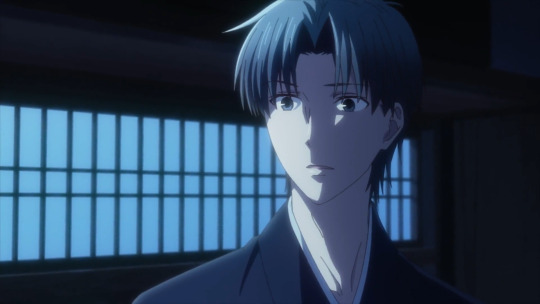
Yes, Shigure.
Y'all heard me right.
The final piece to what makes Furuba work, the one who instigated the plot in the first place.
And I'm sorry if y'all get mad at me for saying that, but I really don't think this is an incorrect assessment. I'll die on the hill that it was an obvious what if.
There's superficial things one can have fun mentioning in regards to these two ー
Across all adaptations of Furuba, Shigure is the first Sohma we are introduced to
Shigure's cursed year is the Dog, Tohru's birth year is the Dog
But the biggest thing for me is in how Tohru is an intrinsic part of something Shigure lacks as a person, that being empathy.
To make myself clear, I'm not saying Shigure is completely void of empathy. Because we can see him expressing it to the people he cares for in the story. (Ex. Wanting to go on a vacation during Golden Week so Hatori can avoid his ex's wedding.)
But for Shigure, empathy isn't something that comes easy for him. As he words it, his kindness isn't as good as the real thing someone like Hatori has. Shigure considers his kindness a hastily manufactured afterthought.
He's someone perfectly content using someone if he gets something out of it. And if he sees someone hesitating to reach for something they want, he'd rather just provoke them into action than attempt to warmly encourage them or understand where they're coming from. Because he doesn't see a point in hesitating at all and frankly, he knows comforting people like that doesn't come easy to him. So he normally opts not to.
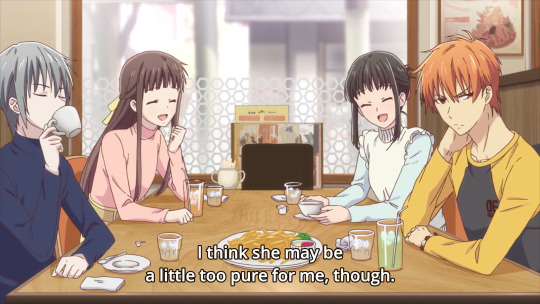
As such, he's fascinated by the levels of empathy and kindness Tohru has. Tohru's kindness sometimes even makes him feel guilty and Shigure isn't someone who often feels guilt in the first place.
Contrast to him, Tohru is so pure that Shigure can't help acknowledging how twisted he is. In season 1/the manga's first arc, he even tells Hatori that because of that forced realization he gets every time he looks at her he thinks Tohru is too pure for him.

Compare to that to our final arc of the manga/season ー where it all eventually escalates to Shigure's quiet contemplationthat maybe he should have dreamed of Tohru.
That it's most likely that Akito wasn't the right one to dream of.
That someone as twisted as him needs someone like Tohru to balance it. To be that beacon that can lead him into being a 'normal' person.
He genuinely thinks about it in that moment as he playfully tells Tohru 「もしもの、お話し」 which is more accurately translated as "It's a what-if story".
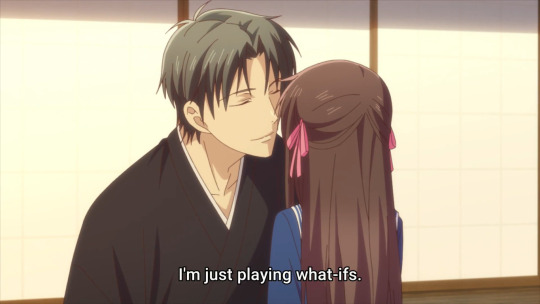
Had Shigure dreamed of Tohru all those years ago, what would have been different?
...
But Tohru isn't who he dreamed of and this is the bed Shigure has decided to make for himself. One he has kept on the path of for years. So he lets himself think about the what ifs for a moment before ultimately deciding to keep lying in the bed he's made in hopes of the day Akito finally comes around.
But it's in Shigure's mind, and now the audience's mind, that more than likely it should have been Tohru. Tohru and what she represents is who he should have dreamed of.
You can see signs that a relationship with Tohru is something Shigure's considered even vaguely in the series even before that point though.

Sure it's passed as a joke, but when you look back at the scene with the "what if story" goggles, you can't help wondering "was it really though?"
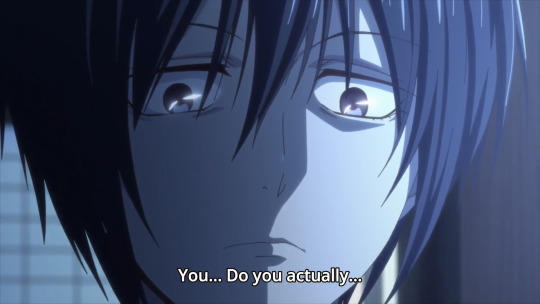
Hell, Shigure desiring Tohru is something that even Akito feared.
She was enraged at the thought very thought of it during the Summer Vacation arc. It's what set Akito off enough to tell Tohru that she is the God of the zodiacs and they all belong to her, Shigure in particular.
Akito was already even in an agitated state before she asked Shigure if he felt anything even partially romantic towards Tohru. Why? Because she's displeased that Shigure isn't kind to her the way he used to be. That he used to only look at Akito but now he doesn't. She wants him to be kind to her again, like he was before.
And Shigure is exceptionally kind to Tohru.
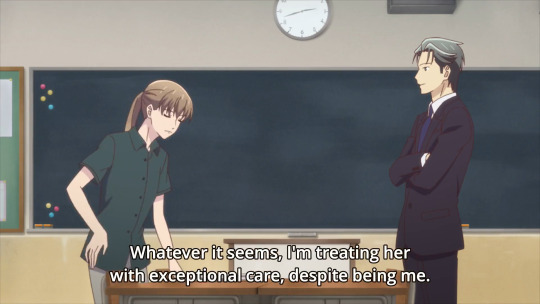
Like he is very careful and considerate when he comes to Tohru which he even confesses to Mayu at one point when she tells him that he should treat her carefully. He tells her 「これでも僕にしてはめずらしいくらい大切にしてると思うんだけどね」 which can, more accurately be given a rough translation of "I think it's unusual for me, but I'm taking good care of her" or even "I think it's unusual for me to value someone this much".
And if you look back on the series, that isn't cap.
Excluding characters like Kisa, Hiro and Momiji (who isn't the same age as the other two but acts youthful enough it is easy to forget), Tohru is the only character Shigure doesn't really treat the way he does everyone else.
Shigure has no problem poking and prodding at people, even in moments where they're very clearly in emotional turmoil when he says them.
Asking Yuki what Akito told him during the Summer Vacation arc.
Telling Kyo that he is using hating Yuki as a shield for what he doesn't want to think about.
(... Telling Akito "bitch I wouldn't have cheated on you if you didn't cheat on me first" lmaooo.)
Even if at the end of the day, it is coming from his own way of caring (trying to get people to act and move forward), that doesn't change the fact Shigure can be a complete asshole. One that will say some very hurtful things to people.
And he's done it multiple times to the same people over and over again. Measuring what's the right amount of what to say to avoid or invoke a specific reaction that he does or doesn't want. Sometimes it's played for laughs, other times it is to rile someone up so badly they cannot contain their aggravation.
So it really isn't cap when he tells Mayu he does, in reality, treat Tohru very gently. For all that Shigure is capable of doing, he treats Tohru with more care than he normally gives to people. Especially considering he has no real reason to since she was a stranger to him until recently.
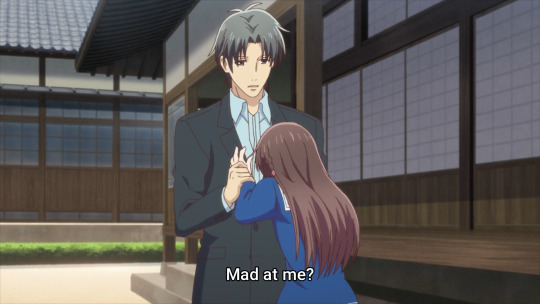
It takes Shigure until the final arc to do anything of his usual nature to Tohru. And when he does, he asks her if she's mad at him afterwards. It doesn't sound like much until you realize he's never done anything of that sort for any other character in the series.
Yuki. Kyo. Akito.
He'll back off. He might sigh and state it's pointless to continue a debate when he and the other person are going back and forth in circles. But he never asks to see how that other person feels because he doesn't care. Hell, he can tell if that other person is upset with him or done with his shenanigans.
And yet with Tohru, he feels compelled to ask for the first time ever.
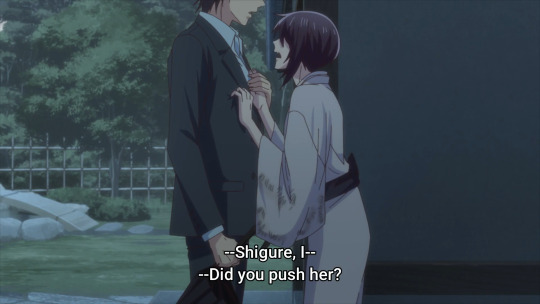
And, of course, I can't talk about all this stuff and not mention Shigure's calm fury when Tohru fell from the cliffside. He stayed quiet for damn near 20 seconds as he processed that Akito told him that Tohru fell and we don't see his face the entire time he's processing. Then once he finally pulls himself together, he couldn't even let Akito finish her sentence when he asked if Tohru's 'fall' was a push.
We never truly get to see in Furuba, something that could set Shigure off.
But I think in that moment we get a glimpse of it. A glimpse that shows just how strongly he feels for Tohru. Because it begs the question, if Akito had pushed Tohru off that cliff, what would Shigure have done? How would he have reacted? I don't think even Shigure knew how he would have reacted.
I'm honestly morbidly curious.
That's all to say, that, "what if" story was with Shigure. Not Momiji, not Yuki. It was Shigure.
'If you didn't end up with A, you definitely would have ended up with B'. If we narrowed this down to Yuki and Tohru specifically, there's only two other characters that come close to that. If it wasn't Machi for Yuki and Kyo for Tohru ー YuKyo and ShiTohru would have been at the finish line.
If Shigure had dreamed of Tohru... or hell, what if he had dreamt of Akito but decided that that dream alone wasn't enough to keep the canine sense of loyalty he was cursed with?
There definitely would have been more than just proposals played for laughs and musings of that 'what could have been's.
Well anyway if you're curious to see my take on what it could have been like if Shigure dreamed of Tohru (complete w/ YuKyo and onesided AkiGure) do I have the story for you because I'm writing it on AO3. Read and give me comments to validate my delusions wwwwwwwwwww
#look she's answering#anon#fruits basket#furuba#lmao i was wheezing this because some of y'all might get mad at me for saying it#but at the same time i'm totally right not sorry#fruba#akigure#shitohru#shigure x tohru#kyoru#ish i kinda mention them here#animanga thoughts
13 notes
·
View notes
Text
Hello, hello! And welcome to the Witch's Cafe! Have you gotten weary? The crushing loneliness of your own self-torment became way too much? Fret not- this establishment is here for all witches; those who have fallen from the greatest of heights, to those who have been left with nothing at all.
Here in this little coffee bar settling between the cosmos, our customers have traveled far and wide just to socialize and find solace within their shared agonies- some managing to cross through universes; so be on the lookout for those whose faces you might have the luck to recognize!
We also herald our existence with this flag- oh, don't you worry! This flag is free for anyone to use, even if all our operations were to cease!

With all that being said, I'm certain you would like to know the way through these halls;
#Witching Hours: The customer list! Go right ahead and greet yourself to these fine folks! Maybe you'll find more similarities between yourselves than you would intially assume. (Gen. tag for crossover witches made by other people)
#Registered Witches: What cafe would this be if we didn't have any regulars? Recognized their choices of beverages just like the back of my hands! If you wish for a story, they're your go-to's! (Witch essays written by either mod H.N Elly or mod Charlotte)
#Witch cards: Every now and then, familiar faces start popping up more than usual; not as much as our regulars, but it is fun to observe their activities, even if from a distance. (same as the above, but in the form of much smaller witch cards)
#Would Witch Out: Passerby's and their rumors...honestly, you couldn't blame a gal for eavesdropping every now and then, no? Not even while getting the latest scoop on who was the poor soul whose destiny caught up with them? (due to the shutdown of YFWWO and in order to give its mod a break, I've opened up operations here. Submissions are now closed! HOWEVER, the ask box is still open for those who would like to share their opinions on certain witch-related matters. We also encourage adding a reason behind their inevitable demise. The list of pending requests can be found here.)
#Would Survive PMMM: Of course, some folks do happen to be naturally lucky; finding a way and reason to keep going forwards even in the darkest of nights...it's admirable, maybe a little enviable, don't ya think? (The complete opposite of the above; if you know a character who would cakewalk through this universe's trials and tribulations, let us know with the full details regarding why!)
#There Is a Pipe Bomb in your Mailbox: Those lil' misfits out there and what tricks they got on their sleeves- ah, what fun would it be if I didn't allow any tomfoolery every now and then? (The joke submissions tag)
#There is no Secret Menu!: (The shitpost tag; hey, the great Italian poet, Dante Alighieri, had called his little self-insert fanfic in which he and Virgil went through all sects of the afterlife "The Divine Comedy" for a reason, right? We all need a reason to crack up since we're gonna be in our self-inflicted torment and punishments for some time.)
#You're now listening to . . .: Solace can be nice every once in a while, but a nice tune to distract yourself from the pain and get in the mood to continue working on your eternal goals is just as comforting! (general audio tag)
I do also have to warn ya'll that we also have to abide by the blacklist; yeah, we do try to cater to all that enter these doors, but an eldritch horror needs to have some standards, ya know?
Hetalia
Country Humans/Country Balls
Any of the media created by Okegom/DeepSeaPrisoner
Minecraft SMPs, especially Dream SMP
Building upon the above, we do not take requests for real world figures, unless if they were obvious jokes. This includes, and is not limited to, youtubers, musicians, pop idols, and individual game developers.
The Mandela Catalog
Harry Potter
7 notes
·
View notes
Text
The Master could be happy, and it wouldn't even involve fanfic!
This essay is brought to you by caring way too much about the Master because Sacha Dhawan’s superbly psychologized portrayal of the Spymaster presents heartbreaking glimpses into the pain and loneliness motivating the character.
I also feel sorry for the Master, no matter who plays them, because they’re narratively stuck in the role of villain, and they’ll never be happy.
From Roger Delgado’s first appearance, the Master has been defined by the showrunners as the Doctor’s greatest enemy [in competition with Daleks and Cyber people]. The show’s repeated reference to the Master’s past friendship with the Doctor complicates the portrayal of the Master as the Doctor’s enemy. So does New Who’s periodic exploration of the Master’s affinity with the Doctor. However, the Master ultimately functions as the Doctor’s opponent, enemy, and antagonist.
And from the beginning, DW has defined the Master’s antagonism as one in which the Master embodies the opposite of what the Doctor [supposedly] stands for. The Doctor spreads happiness and wonder; the Master spreads misery and suffering. The Doctor explores, creates, and discovers; the Master hides, retreats, and destroys. The Doctor represents good things, which leaves the Master to represent bad things.
The definition of the Master as antagonist/opposite of good/cruel wretch confines the character to a miserable status quo. The show allows the Doctor’s companions, as well as tertiary characters, to experience arcs over which they change and often become more mature and happier. The show even allows various Doctors to learn things over their tenures [for good or for ill]. The Master never has the chance to learn and change and develop as a character in a way that would grant them any insight, maturity, peace, or contentment, however. If they did, they would cease being the Doctor’s evil antagonist, and the show depends on the Master’s perpetual, restricted existence as the Doctor’s mean/bad/wrong counterpoint.
It doesn’t have to be that way, though. The Master could be a dynamic character who experiences arcs of development and change. The character’s role as antagonist would need to be reworked, however.
DW assumes that the Master, as the Doctor’s antagonist, must necessarily be evil, bad, wrong, and miserable in contrast to the Doctor. But that’s wrong. Antagonists aren’t necessarily enemies. A protagonist is the character that the story is about--the Doctor, in this case. An antagonist is merely a character who works against the protagonist. Conflict often arises between protagonist and antagonist because the antagonist is thwarting the protagonist. But that doesn’t mean that the antagonist is an enemy or wrong or unhappy. Nothing about the protagonist/antagonist relationship requires that the protagonist = good guy/moral exemplar/happy person, while antagonist = bad guy/bad example/unhappy loser. The Master/antagonist functions as the villain in opposition to the Doctor/protagonist only because the showrunners have decided that the Master is mad, bad, and sad.
The Master doesn’t have to be a villain, though!
We can imagine many alternative ways for the Master to play antagonist to the Doctor’s protagonist. Perhaps the Doctor makes an impulsive, hearts-based decision to save someone, while the Master, analyzing potential complications, tries to stop and think before acting. Relatedly, maybe the Doctor trusts people and thinks the best of everyone they meet, while the Master prefers to wait and see. Or the Doctor, a staunch pacifist, hates guns, violence, and war, while the Master believes that guns, violence, and war have their place as self-defense. While the Doctor/protagonist and Master/antagonist would be angry at and frustrated with each other in such cases, nothing about these setups dictates that the Doctor has to be happy, morally right, and surrounded by friends, while the Master is unhappy, morally wrong, and lonely.
The Doctor and the Master don’t even need profound philosophical differences to act as counterpoints to each other. The Doctor could be a quiet person who prefers a few close friendships with their companions, while the Master prefers loud parties where they’re the center of attention. That’s a much more comedic framework than the political themes that DW often touches on, but DW has its funny side too. It’s entirely possible for the show to explore different sides of a topic through the Doctor’s and the Master’s divergent viewpoints, while also entertaining us because, say, the Doctor likes fish fingers in custard, and the Master has sensory ICK over custard.
None of these scenarios that I describe are predicated on the protagonist being good and happy and the antagonist being evil and sad. Instead, these scenarios depend on differences, but the differences are neutral. Because the Master’s beliefs and personality differ from the Doctor’s in these cases, the Master has many opportunities to work against the Doctor as an antagonist. Nevertheless, these scenarios say nothing about the Doctor/protagonist being good/happy/right and the Master/antagonist being evil/sad/wrong. By moving beyond a simple binary framework, these scenarios allow the Doctor and the Master the possibility of learning from each other, understanding each other, respecting each other.
And that is how the Master could have a chance at insight, change, and happiness, while still being the Doctor’s antagonist.
@natalunasans @spoonietimelordy @queen-of-meows @sclfmastery @whovianuncle
#the master#sacha dhawan#dhawan master#doctor who#dw meta#HELP I WUVS HIM#why I love Dhawan Master#the power of the doctor#protagonists and antagonists#why the Master is always miserable
65 notes
·
View notes
Text
9 favourite books
Thank you @gwiazdziarka for tagging me (and thanks for all those book recs, I’m adding all of them to my list, except for the ones that I’ve already read), and I agree, maybe all of these won’t be my absolute favorite books, but they’re either books that I think about a lot, or books that have a special place in my heart, but not necessarily something that I go back to over and over.
The Little Prince by Antoine de Saint Exúpery
This one is definitely a favorite. It’s a book that I’ve reread many times, because I feel that it has a different feel every time, depending on what I’m going through at that moment. Also a classic. Love it so much that I’ve started to collect editions in different languages; so far I have Spanish (of course), French, Italian, Chinese, Korean, Japanese, Euskera (possibly one of the rarest), and Swedish (of course, because I intend to be able to read it by next year).
Neverwhere by Neil Gaiman
Also an absolute favorite, classic down-the-rabbit-hole type story that takes place in London Below. Fell in love with it, with the world-building within an already existing world. If i actually had to list 9 of my favorite books, pretty sure the whole list would be Neil Gaiman, but this book is both entertaining and comforting, so I pick this one. The BBC radio drama adaptation starring James McAvoy and Natalie Dormer is also excellent. Still waiting for the book sequel, though…
84 Charing Cross Road by Helene Hanff
The most charming book in history, composed entirely of letters between an aspiring writer and rare books collector in New York and the manager of a rare books bookshop in London. Their relationship is platonic, and yet one of the most romantic things I have ever read. The movie adaptation is equally charming and it has Anthony Hopkins and Judi Dench in it. Read the book first, then watch the movie, then cry endlessly. Rinse and repeat.
Like a Hole in the Head by Jen Banbury
You should know that I get a lot of book recommendations from TV shows, so I decided to hunt down this book when Monica was reading it in more than one episode of Friends (felt like a subliminal message). And it was fucking worth it. Also a book about a book. A dwarf comes into a bookshop where the protagonist works, to sell a first edition of Jack London’s White Fang, and only after he’s gone she finds out just how rare it is. Heist plot ensues. It’s equally strange and exciting, mind-blowing and cathartic.
The Opposite of Loneliness by Marina Keegan
Very melancholy, this book is a collection of essays, poems and short stories published posthumously, as Keegan died in an accident at 21. She was very talented and could write convincingly about many things. Can’t even pick a favorite one out of the collection, because they’re all very good in very different ways. Very bittersweet.
Los Caballos Estornudan en la Lluvia by Dimas Lidio Pitty
Another short story collection (the title literally translates as “Horses Sneeze in the Rain”), from a Panamanian author, from the region where I spent my childhood summers, which still holds a very special place in my heart, and which has a mysticism about it that he helps preserve in these stories. Dimas Lidio Pitty was very good at magical realism. One of the stories in particular is so brief, but it’s incredible how good it is in such a short narration.
Fahrenheit 451 by Ray Bradbury
I’m a huge fan of classic dystopic science fiction, and this one has got to be my favorite. The narrative is interesting, moves along at an excellent pace, and it covers everything. Another book about books too. If you haven’t read Fahrenheit 451, the premise is simple: in this dystopic society, firemen don’t put out fires, they start them… to burn books. Book banning to the extreme. What happens next? You need to read it to find out.
El Misterio del Solitario by Jostein Gaarder
I have been obsessed with this book (The Solitaire Mystery in English) by Norwegian author Jostein Gaarder since I started reading all his books when I was a teen (I don’t even know how I came across him, I just picked one up one day and went with it, it wasn’t even Sophy’s World, it was Through a Glass, Darkly). Of course Sophy’s World is probably the most famous, and it was very good, but this one is so strange and magical that I read it several times ages ago, and it was such a comforting book, and now I would like to reread. Maybe one day soon I’ll read it in Norwegian!
The Wizard of Oz by L. Frank Baum
Another classic and favorite, which I have also read many times. Some people like Alice in Wonderland, some like Peter Pan, I like the Wizard of Oz. I like anything Oz related, the movie, the musical, Wicked (the musical, not the book, tho), everything. But the source material is still where it’s at.
No pressure tags: @makingupachangingmind , @voldiebeth , @raincitygirl76 and @phoebenpiperx .
#booksbooksbooks#booklove#book recs#i love learning about what people are reading or have read or love to read#give me all the book recs#i wish i could have a book club with everyone here
9 notes
·
View notes
Text

1964 Worlds Fair. I went.
* * * *
“Healing is impossible in loneliness; it is the opposite of loneliness. Conviviality is healing. To be healed we must come with all the other creatures to the feast of Creation.
(pg.99, "The Body and the Earth")”
― Wendell Berry, The Art of the Commonplace: The Agrarian Essays
+
“And there are never really endings, happy or otherwise. Things keep going on, they overlap and blur, your story is part of your sister's story is part of many other stories, and there is no telling where any of them may lead.”
― Erin Morgenstern, The Night Circus
#New York#World's Fair#1960s#community#Wendell Berry#Erin Morgenstern#The Night Circus#healing#conviviality#the feast of creation
6 notes
·
View notes
Text
//kaveh character story spoilers
.
.
tldr: kaveh has so much angst and I love him for that. babygirl is suffering (I am suffering with him) (also some sucrose parallels bc I'm sucrose's no.1 fan and also some flavors of haikaveh angst)
Foreword
this is honestly just the word dump I threw together bc I couldn't sleep, thinking about angsty kaveh art and how he may now be my second fav character
what's not to love about a man so filled with angst, so riddled with guilt and unable to escape the ghosts of his past? who believes everyone can reach the same heights if they work together, but unable to let others see his own weaknesses? who hates loneliness, but would suffer through it for the happiness of others? wishing to attain the pinnacle of his craft, even if he has to give up everything to see it through? a man who wishes to love everyone around him, but is unable to accept any for himself?
Idealism
ok this is the sucrose part and it is kinda a stretch but I like both of them very much and my target audience is always me, I do what I want
kaveh designs with practicality and artistry in mind, unwilling to give either up, to the point that when he finally gets to create something that he can go all out on both fronts on, he is willing to give up his home to see it through (even then he still owes dori for helping him find the project). when he works with others, he tries to help others keep up because there shouldn't be a gap between "geniuses" and those who aren't, even of it means more work for himself. sucrose is so intent on bioalchemy because of a childhood promise to reach a mythical domain from a fairytale with her ex-friends, both of which have moved on (one literally never returns to mondstadt, one breaking off their friendship after a domestic tragedy). regardless, she still works to achieve the paradise they wished to see as the only way she can make good on that promise. even now she hopes beyond hope that if she can create the wonderland from that fairytale, her friends will return. neither of them have accepted their reality; kaveh's idealism alone isn't enough to fund the construction of a palace, carrying extra burdens wasn't enough to bridge the gap between alhaitham and him and their fellow researchers; sucrose's friends are unlikely to return if she is even able to create that paradise in the first place
(bonus: not gonna type an essay for this one, but there's just something about the way they have lost people but don't let others know it hurt them; kaveh pretending it was fine when his mom left, sucrose never mentioning her friends or the wonderland to anyone)
Alhaitham
I have been typing on mobile and frankly the word vomit and angst have quite thoroughly rotted my brain, sorry if this no longer makes sense
god these two are so. the whole opposites thing they have going on. yes ok shipping them is cool, I get it (roommates, bickering like they're married, opposites attract, etc) but like. imagine this. they both care about each other, ever since their akademiya days, but they express it differently; kaveh with his whole "I wanna help people unconditionally, but if you help me, I will return the favor even if I suffer for it" vs alhaitham with his "I don't care what other people think, I do what I want (and I want you to stop making yourself suffer, why won't you let me just help you)" (ok yeah I made that last part up, pretty sure that wasn't quite how it went) and because of this and on account of how stubborn they both are, neither of them are able to ever see eye to eye again. they eventually come to tolerate each other but they'll never be able to be what they once were; after all, their relationship as built on a foundation of sand. kaveh's mom had just left him, and he had heard about a genius new student; maybe someone who could fill a bit of the loneliness in him. they were perpendicular lines, different from the start, only intersecting once, and bount to drift down different paths
opposites angst aside though, an alternate flavor of angst: alhaitham tries to show care/affection for kaveh, but kaveh with his paranoia of abandonment and fear of loving and getting hurt again, rejects him (if anyone has heard 'namonaki kanjyou' by usotsuki, yea).
that's all I have for that one I am tired and the brainrot is getting harder to fight off
#and I'm home#see you tomorrow#rambles#genshin#genshin impact#genshin kaveh#kaveh#sucrose#alhaitham#i was supposed to do stuff today#but instead i have been going sketch delete repeat#needed to get this out even if getting it out doesnt help#theres also some other stuff i couldn't find a way to add#namely the 2 madoka character songs#the kyoko and sayaka one literally titled#and the madoka one#where she fake smiles as she waves goodbye (idk i wasn't paying attention to the lyrics)#also again apologies for any spelling or formatting things i am on moblie and have typed for an hour
18 notes
·
View notes
Text
Across the Spider-Verse and the Art of Purposeful Fan Service
[The following essay contains MAJOR SPOILERS; YOU HAVE BEEN WARNED!]
Modern blockbusters—especially those belonging to the increasingly ubiquitous superhero genre—have evolved into mega-budget Easter egg hunts. Users on Twitter, Tumblr, and other social media platforms dissect every new theatrical release frame-by-frame, searching for cameos, callbacks, and references to the source material. Often, these allusions are little more than gratuitous fan service. Occasionally, though, they exist for a thematic purpose, enriching the film’s overarching narrative.
Consider, for example, the intertextual dialogue between Spider-Man: Across the Spider-Verse and “The Night Gwen Stacy Died” (The Amazing Spider-Man #121-122).

The latter, a two-part comic book story written by Gerry Conway and drawn by Gil Kane and the late John Romita Sr., features the most heartbreaking sequence of images in Marvel’s entire mythos. It begins when the villainous Green Goblin flings an unconscious Gwen Stacy—the love of Peter Parker’s life—off of the George Washington Bridge. Acting quickly (indeed, perhaps a bit too hastily), the Wall-Crawler fires his web shooters, catching his girlfriend's leg an instant before she hits the water. The whiplash of the split-second rescue jolts her limp form—and above her neck, the issue’s letterer pens a bone-chilling sound effect:
“SNAP!”
When Spidey pulls her up to safety, he is horrified to discover what the reader already knows: Gwen Stacy is gone, her spine shattered by the force of her abrupt stop.
In Across the Spider-Verse, a super-powered variant of Gwen from an alternate reality explicitly mentions this tragedy in conversation with protagonist Miles Morales, implying that it is one of the multiverse’s pivotal “Canon Events,” akin to the murder of Uncle Ben:
In every other universe, Gwen Stacy falls for Spider-Man. And in every other universe, it doesn't end well.
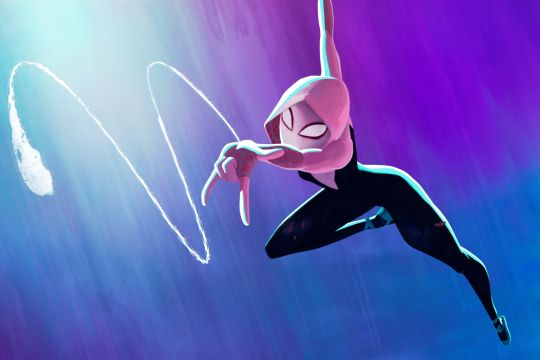
These prophetic words eventually return to haunt Gwen during the movie’s climactic chase scene. Miles, attempting to evade a literal army of his fellow Spider-People, misjudges a leap and finds himself plummeting toward the futuristic cityscape below. Fortunately, a web snags him by the chest, halting his fall. Gwen clutches the other end of the line. She grins, relieved; while they’re on opposite sides of this particular conflict, she has no desire to see one of her few real friends harmed.
Miles, however, responds to her sympathetic smile with a cold scowl; after all, she betrayed him (albeit reluctantly) to the Spider-Society, so he is not in a forgiving mood. “Goodbye, Gwen,” he growls, seizing the strand of webbing with both hands and effortlessly ripping it in two:
“SNAP!”
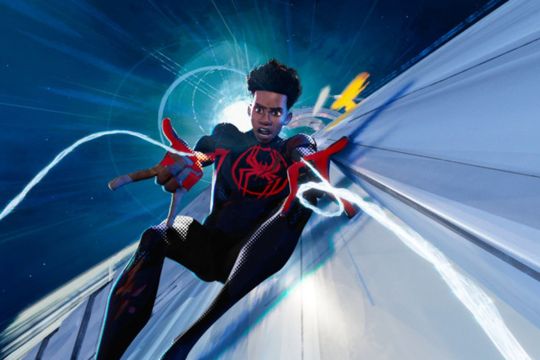
And as Miles makes good his escape, Gwen Stacy figuratively dies. Disowned by her father, discarded by her allies, and abandoned by the person that she most wanted to protect, the aloof heroine has nothing left. Her habit of preemptively keeping her loved ones at arm's length in order to avoid the pain of loss has finally condemned her to loneliness, isolation, and solitude.
Even with the "traditional" roles reversed, their relationship was doomed—just as it was in the original version of the tale.
#Spider-Man: Across the Spider-Verse#Across the Spider-Verse#Spider-Man#The Amazing Spider-Man#The Night Gwen Stacy Died#Gwen Stacy#Miles Morales#Gerry Conway#Gil Kane#John Romita Sr#Marvel Comics#Marvel#aimation#comics#comic books#film#writing
3 notes
·
View notes
Note
The opposite of loneliness by marina Keegan :) a collection of essays, poetry, and short stories
This description seems so timely 👀💗 Ty!!
14 notes
·
View notes
Text
ˏˋ°•*⁀➷ Definition of True Narrative and Testimony, Mini Critique ༊*·˚
Definition of True Narrative
True Narrative refers to a story that accurately reflects real events, people, and experiences. It aims to convey truth through storytelling while allowing for creative interpretation and narrative techniques.
Examples of True Narrative
• "Trial by Twitter" by Holli Millea, in which she narrates the true story about the murder of Skylar Neese.
• "Shooting an Elephant" by George Orwell, where the narrator (orwell) depicts his experience of shooting an aggressive elephant while working as a police officer.
• "The opposite of Loneliness" a book by Marina Keegan, compiling beautiful essays and stories made by her, containing lots of inspirational stories about her life.
Definition of Testimony
or Testimonial Essay
Meanwhile, Testimony involves firsthand accounts or statements from individuals about something they saw, experienced, heard, etc.
Example of Testimony
• An example of testimony can also come from "Trial by Twitter" as the author has provided statements from the people involved in the situation, such as the police, Skylar's friends, parents, etc.
• "From Homeless to Hopeful: A Story of Resilience" By Jamal Williams, where Jamal recounts his journey from homelessness to stability, detailing the obstacles he faced and the support that helped him rebuild his life.
• "Finding Hope in the Darkness" by Sarah Johnson, wherein she shares her journey of overcoming depression and finding hope through therapy and self-discovery.
Mini Critique
Introduction
• Marina Keegan
• "The Opposite of Loneliness" (https://yaledailynews.com/blog/2012/05/27/keegan-the-opposite-of-loneliness/)
• People shouldn't focus on their regrets on life, rather, focus on trying to act upon changing for the better, It's never too late for anything.
Summary
• There's no word that can describe the Opposite of loneliness, it's a feeling we can all feel, And everyone wants to feel it. "We don’t have a word for the opposite of loneliness, but if we did, I could say that’s what I want in life."
• The opposite of loneliness isn't always about having someone to love us, it's our own experiences is what defines it for us, it could be about the simplest moments that we feel we don't wanna leave, or the biggest monents like graduating and finally leaving school. "It’s not quite love and it’s not quite community; it’s just this feeling that there are people, an abundance of people, who are in this together. "
• As the text concludes, keegan tries to give the readers hope and inspiration to continue with their life, it's not about what happiness is, what love is, the regrets we have, the choice we wished to have. life is all about facing the present, making changes to our life and working on making a new beginning. "What we have to remember is that we can still do anything. We can change our minds. We can start over. Get a post-bac or try writing for the first time. The notion that it’s too late to do anything is comical. It’s hilarious."
Evaluation
• "The Opposite of loneliness" is a great narrative that can touch the readers hearts. The main argument of the essay can be interpreted by different readers, it could be about embracing possibilities, being open to change, and not thinking about regrets we have in life. What's past is past, and what's important is that we face our future with a proud face held up.
• This main themes can be associated with the anxiety faced by lots of teenager or graduating students. They all have regrets about taking a course that they do not want, and always considers the possible outcomes of not making such decisions. The text makes a point that all these are no longer important, what's happened has happened, and there is no way to change it other than focusing on the present or the future.
• The author had made her point, providing her own experiences and perception, successfully giving the readers something to be inspired about in life.
Conclusion
• As a reader, I totally agree to what the author had stated. The line that says "The notion that it’s too late to do anything is comical. It’s hilarious. We’re graduating college. We’re so young. We can’t, we MUST not lose this sense of possibility because in the end, it’s all we have." has made such a strong impact on me. It opened my eye on the different possibilities or opportunities I could achieve in life, and how it's never too late to do something to achieve them.
• As a student who's graduating, I've always thought that maybe it's too late to change my path, the craziest decisions I've made has already altered my track in the future, but this text had successfully gave me such inspiring quotes that I've had a reflection about my own perspectives upon reading it.
• Overall, I'd like to say that this piece is the most inspiring and eye opening work I've read. I have these moments where I feel that my life is falling down, and no actions i take can do to solve it, But after reading, I feel motivated about life. I think that if other people were to read it, they'd feel the same as me.
0 notes
Text
The Opposite of Loneliness: Essays and Stories
Author: Marina Keegan
Rating: 2/5
Marina Keegan graduated magna cum laude from Yale University. Unfortunately, she died five days after her graduation ceremony in a car crash. This is a collection of her writing.
Spoilers ahead.
Continue reading Untitled
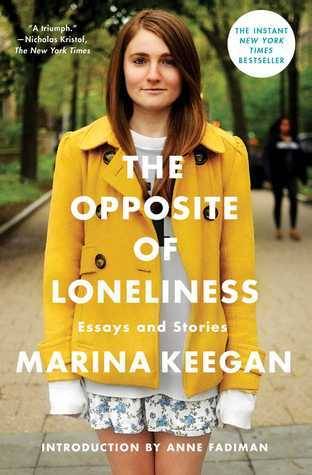
View On WordPress
0 notes
Quote
We don't have a word for the opposite of loneliness, but if we did, I could say that's what I want in life...It's not quite love and it's not quite community; it's just this feeling that there are people, an abundance of people, who are in this together. Who are on your team. When the check is paid and you stay at the table. When it's 4a.m. and no one goes to bed. That night with the guitar. That night we can't remember. That time we did, we went, we saw, we laughed, we felt.
Marina Keegan
-- “The Opposite of Loneliness: Essays and Stories”
2 notes
·
View notes
Quote
We're so young. We can't, we MUST not loose this sense of possibility because in the end, it's all we have.
Marina Keegan, The Opposite of Loneliness: Essays and Stories
#not so motivational quotes#motivational#positive thinking#laws of universe#law of attraction#intentions#manifestation#manifesting#abundance#quotes#loa#money#love#tips#inspiration#inspiring quotes#Marina Keegan#The Opposite of Loneliness: Essays and Stories
16 notes
·
View notes
Link
best political biographies or autobiographies : The Opposite of Loneliness | Biography & Memoir
Listen to The Opposite of Loneliness new releases best political biographies or autobiographies on your iPhone, iPad, or Android. Get any TV and Radio FREE during your Free Trial
Written By: Marina Keegan
Narrated By: Emily Woo Zeller
Publisher: Tantor Media
Date: April 2014
Duration: 6 hours 0 minutes
#The Opposite of Loneliness: Essays and Stories#The Opposite of Loneliness Audiobook#Audiobook#Biography & Memoir#Marina Keegan#Emily Woo Zeller
1 note
·
View note